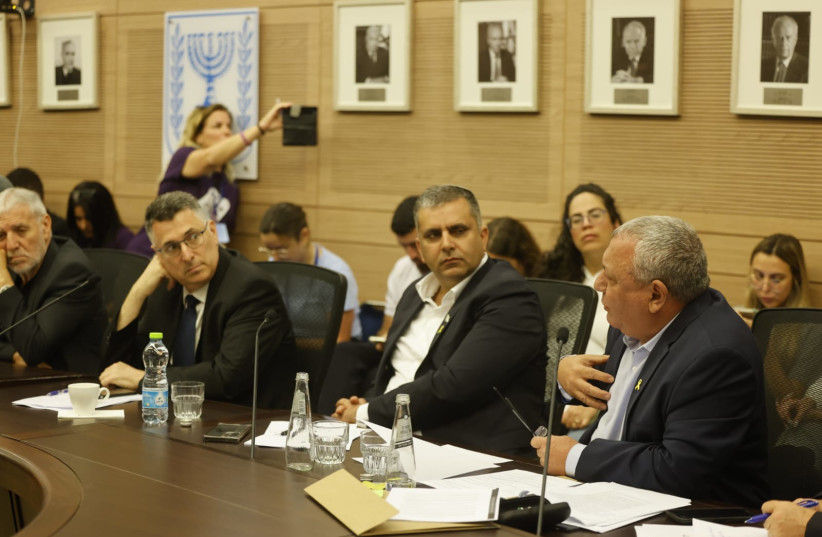Israel's parliament (Knesset) began on Tuesday to debate the highly-charged political and social issue of the ultra-Orthodox (haredi) service in the IDF.
The debate was held in the Knesset Foreign Affairs and Defense Committee (FADC) led by Likud MK Yuli Edelstein. The committee will continue debating the bill with a series of debates in the coming weeks.
Negotiations by Prime Minister Benjamin Netanyahu, leaders of the haredi parties, and representatives of the finance ministry, the defense ministry, and the security establishment failed to reach an agreed-upon text for a government-sponsored bill in order to regulate the issue, as the haredi parties, who are key members of Netanyahu's coalition, generally oppose haredim joining the IDF.
The terms of the bill
Netanyahu opted instead to adopt a bill that passed its first reading in 2022 during the Bennett-Lapid government's tenure. The bill, in general, included a gradual increase of haredi draftees, with the goal of reaching 35% of military age haredi men serving in the IDF by 2036. It included sanctions on haredi yeshivot that did not meet the quotas, but not on the draftees themselves.

Israel's attorney general and members of Knesset from both the coalition and opposition criticized the move, as the 2022 bill is not relevant to the needs of the IDF after the outbreak of war following the October 7 Hamas massacre. However, all members of the coalition who opposed the bill, save for Defense Minister Yoav Gallant, decided to support the measure to bring it to the Knesset, arguing that this was technical and that they would not support the bill's second and third reading if it was not modified in the FADC.
Edelstein began the committee debate by acknowledging that the current bill on the table was irrelevant and that the committee would come up with an improved version for the second and third reading in the Knesset. However, Edelstein stressed that the IDF needed to ensure that haredim could maintain their lifestyle and leave the IDF as Haredim just as they entered it.
The Members of Knesset who spoke after Edelstein made a number of arguments. Opposition leader MK Yair Lapid argued that the committee must act swiftly in order to ensure that an appropriate bill passes by the end of the Knesset's summer session at the end of July.
Some MKs, including United Right chairman MK Gideon Sa'ar and National Unity MK Gadi Eisenkot, criticized the fact that the bill on the table was irrelevant and argued that it should be thrown out and that the Knesset should begin a legislative process from scratch that says that every 18-year-old Israeli should commit IDF or national service, including Haredim and Israeli-Arabs. Edelstein responded by arguing that bringing a bill that had already passed its first reading shortened the legislative process by a month or two.
A large number of MKs from both the opposition and coalition argued that there was no contradiction between Torah study and IDF service. MKs who made this point included Yesh Atid's two orthodox MKs, Moshe Turpaz and Elazar Stern; National Unity MK Michael Biton; Likud MK Boaz Bismuth; and Religious Zionist Party MK Ohad Tal. Notably, Bismuth, a member of the coalition, said that he would not support a bill that did not meet the IDF's needs.
Other members of the Likud, including Education Minister Yoav Kisch and MK Eli Dallal, expressed support in a law that would not just raise the number of haredim in the IDF, but make a broader law that would have all haredim who do not study full time commit IDF service.
The legal basis for the haredi exemption expired on July 1, 2023, and the debates began as Israel's High Court of Justice is preparing a ruling on whether the state must begin to recruit haredim in large numbers, given that the exemption violated the notion of equality. The High Court of Justice will also rule on whether the state will be able to continue providing funding to yeshivot for military-age students.
Ynet reported on Tuesday that student unions at Ben-Gurion University of the Negev (BGU) and the Technion-Israel Institute of Technology joined calls from other unions to protest the current iteration of the draft bill.
Along with the student union at Tel Aviv University, they called on Prime Minister Benjamin Netanyahu, Defense Minister Yoav Gallant, and Education Minister Yoav Kisch to "swap the current bill with one that is fair and equal, and that doesn't make the current service load even more heavy."
The unions warned that if the bill advances in its current state, they would use all the means at their disposal to stop it.
Sarah Ben-Nun contributed to this report.
